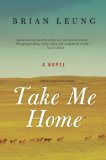Summary | Excerpt | Reading Guide | Reviews | Beyond the Book | Read-Alikes | Genres & Themes | Author Bio

Critics' Opinion:
Readers' Opinion:
First Published:
Oct 2010, 304 pages
Paperback:
Nov 2011, 304 pages
 Book Reviewed by:
Book Reviewed by:
Donna Chavez
Buy This Book
This article relates to Take Me Home
During much of the second half of the 19th century, the Union Pacific Railroad (UP) was able to maintain a monopoly on coal production because it controlled the only means of transportation into the Western territories. Thus it owned and operated all the coalmines, fixed coal prices to its own benefit and was able to establish its own standards - or lack of - for employee treatment and compensation. In 1875, UP cut the piecework rate paid to miners by one-fifth but made no corresponding reduction in prices charged at the Company stores. When the miners went on strike, UP responded by practicing a kind of reverse outsourcing, replacing striking laborers with recently immigrated Chinese laborers who accepted the lower pay.
Indignation and antipathy by White laborers escalated until it erupted on September 2, 1885, when it was rumored that miners in Colorado were receiving a pay raise but those in Rock Springs, Wyoming were not. Welsh and Swedish miners in Rock Springs, most of whom were members of the reportedly militant Knights of Labor rebelled, burning the homes of approximately 75 Chinese families, killing 28 and injuring 15. Many Chinese laborers fled and were picked up by Union Pacific trains.
Resentment and violence against Chinese laborers was not isolated to the Wyoming Territory but occurred in several locations, including Washington State, Montana and Oregon. Indeed it was the national hot button immigration issue of the day.
From 1882 to 1943 the United States strictly curtailed immigration from China to the United States. Competition between American workers and Chinese immigrants plus a growing nativism brought pressure upon Congress to take some kind of restrictive action, which began with the Chinese Exclusion Act of May 6, 1882. This national policy was the result of concern over the large number of Chinese who, responding to the need for inexpensive labor for construction of the transcontinental railroad, came to the United States. The law suspended immigration of Chinese laborers for ten years; permitted only those Chinese in the United States as of November 17, 1880, to stay, travel abroad, and return; and banned the naturalization of Chinese immigrants.
Even more severe exclusionary legislation was passed in May of 1892. The Act to Prohibit the Coming of Chinese Persons into the United States, referred to as the Geary Act, allowed Chinese laborers to travel to China and reenter the United States but its provisions were otherwise more restrictive than the 1885 law, requiring Chinese immigrants to register and secure a certificate as proof of their right to be in the United States. Those who failed to have the required papers or witnesses were either imprisoned or deported. Other restrictive immigration acts affecting citizens of Chinese ancestry followed. However, during World War II, when China and the United States were allies, President Franklin D. Roosevelt signed the Act to Repeal the Chinese Exclusion Acts. This action on December 13, 1943, also lifted restrictions on naturalization. However until the Immigration Act of October 1965, numerous laws continued to have a restrictive impact on Chinese immigration.
Related Links
Filed under Society and Politics
![]() This "beyond the book article" relates to Take Me Home. It originally ran in November 2010 and has been updated for the
November 2011 paperback edition.
Go to magazine.
This "beyond the book article" relates to Take Me Home. It originally ran in November 2010 and has been updated for the
November 2011 paperback edition.
Go to magazine.





The House on Biscayne Bay
by Chanel Cleeton
As death stalks a gothic mansion in Miami, the lives of two women intertwine as the past and present collide.

The Flower Sisters
by Michelle Collins Anderson
From the new Fannie Flagg of the Ozarks, a richly-woven story of family, forgiveness, and reinvention.

The Funeral Cryer by Wenyan Lu
Debut novelist Wenyan Lu brings us this witty yet profound story about one woman's midlife reawakening in contemporary rural China.
Your guide toexceptional books
BookBrowse seeks out and recommends the best in contemporary fiction and nonfiction—books that not only engage and entertain but also deepen our understanding of ourselves and the world around us.